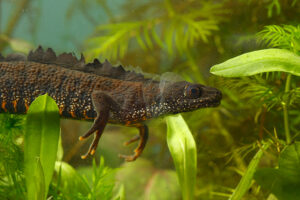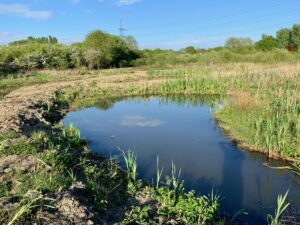Farmers and landowners sought to help create ponds, and protect great crested newts in North Lincs
14th May 2021
A number of ponds are set to be created in the North Lincolnshire area, thanks to a new scheme funded by Natural England that is designed to protect the great crested newt (GCN) species.
Sheffield-based environmental consultancy Wildscapes CIC has been appointed by Natural England to create a number of ponds across the region this year and is seeking farmers and landowners who would like to have these habitats created or restored on their land. Wildscapes CIC will carry out all pond creation/restoration works (including adding suitable fencing if required) and all landowners are asked to do is to take a few basic measures to protect the habitat quality of the pond. These ponds are required to be a minimum size of 150m2 and Wildscapes CIC will carry out maintenance and monitoring visits on a periodic basis over 25 years.
Great crested newts are a European protected species, which means that the newts, their eggs, breeding sites and resting places are protected by law.
Steven Greenwood, Conservation Contracts Manager for Wildscapes on the Great Crested Newts scheme, explains: “During the 20th Century, half of the UK’s ponds were lost and this has led to the serious decline of the great crested newt population. This scheme is designed to support the development process to create more habitats and to secure the long-term protection of this important, protected species.”
The scheme has seen great success in other areas, such as South Yorkshire and Derbyshire, where Wildscapes CIC has recently created its 50th pond.
The project is part of a national strategy to bolster great crested newt populations in stronghold areas and allow Local Authorities to undertake landscape scale management of the population through District Level Licencing. It is anticipated that Natural England will fund the creation/restoration of over 1000 ponds ideally suited for GCN.
Facts on pond loss
- 50% of the UK’s ponds were lost during the 20th century, whilst the majority of remaining ponds are classed as being in a poor state.
- Many ponds are man-made and were mainly lost from our landscape due to land use change; in particular, the move away from mixed farming that occurred from the early 1960s.
- Modelling shows that it is the loss of these ponds that has been the main factor in the decline of GCN.
Landowners/farmers in North Lincolnshire are encouraged to contact Wildscapes to discuss the suitability of their land for the project. More information can be found here; https://wildscapes.co.uk/pond-creation


